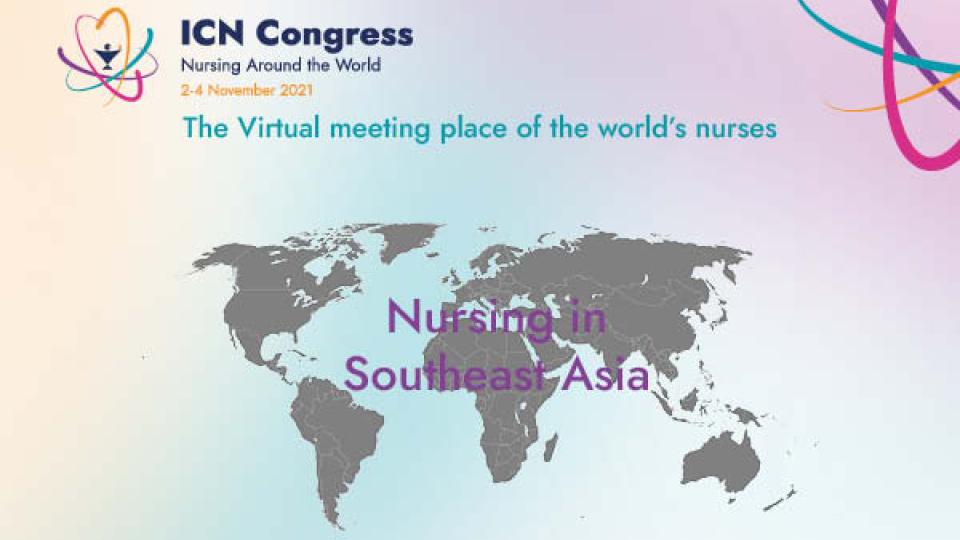South East Asia’s nurses share experiences of nursing during the pandemic and visions for nursing in the future at ICN Congress

The International Council of Nurses (ICN) Congress theme is “Nursing Around the World” and, along with the variety of international speakers, the theme is also reflected in the regional sessions which are being held each day. Today, the voyage around the world visited South East Asia with a series of video case studies and a panel discussion with nurse leaders across the region.
During the panel discussion, prominent nurses looked at nursing in the region during the pandemic and examined what they thought its future would be after the pandemic. Among the findings were the fact that, despite disputes with employers during the pandemic, respect for and autonomy of the profession had increased, as had nurses’ resilience and the overall visibility of the profession.
Nursing students who had their education interrupted suffered anxiety as a result, but digital technology was used to transform nurse training courses, and blended learning became the norm in many educational institutions. However, for some students who did not have access to appropriate equipment or fast, robust internet connections, this was extremely problematic, although technological solutions were eventually put in place so that they were not disadvantaged.
To support the students, who suddenly found themselves in clinical areas with very sick patients, nurse lecturers worked alongside them to provide support, guidance and supervision. As a result, a new generation of nurses was educated to be critical thinkers who could solve problems, ethically and skilfully take care of patients and adapt to new situations.
Case studies from nurses in the region demonstrated the pressures they were under. Indian public health nurse Joy Priyadharishini spoke of nurses’ commitment to keeping in contact with their community-based patients, despite the restrictions that the government had to put in place to prevent the spread of COVID-19. She said that despite many nurses being either sick from COVID-19 or being forced to stay away because they had been in contact with someone who had the virus, many patients who were reluctant to have the vaccination were persuaded to go ahead, thanks to the relationship they had with their nurses. Clinics were changed into mobile units and many new ways of working were developed to enable care to continue to be given. A lot of nurses were fearful at the start of the pandemic because of worries about contracting the infection, stigma from the public, and their lack of knowledge and faith in their inability to provide effective treatment.
Nurses from Nepal said that during the pandemic they have had to overcome infrastructure problems and a scarcity of resources, including advanced equipment, training and personal protective equipment. They said a fundamental problem was helping people to deal with their fears about such a new and dangerous infection. They said they were expecting the number of vaccinations available to increase, and recommended proper coordination between central and state governments to help deal with the COVID-19 pandemic.
Public health nursing officer Defni Perera in Sri Lanka spoke about her work in management, preventing non-communicable diseases, palliative care, paediatrics and disaster relief. One nurse spoke about the anxiety and stress, and the physical burden, of wearing PPE for many hours while providing safe effective care to their patients. She said a major challenge was using public transport to travel to different areas, so many nurses voluntarily used their own vehicles. Other Sri Lankan nurses spoke about being on the front line of the COVID-19 battle in intensive care settings.
One nurse from Thailand said that she had seen many other novel illnesses over the years, and that she expected COVID-19 to be just the others. But she said it kept changing: at first it was said to be transmitted by droplets, then it was airborne, and nurses’ knowledge had to keep up with the changing picture of the virus and take appropriate measures to protect themselves. She said there had been a lot of confusion and facilities were unable to keep up with the spread of the infection, so nurses had to work out ways of treating very sick patients without the negative pressure rooms that would have been the ideal setting for treatment. She said the secret to continuing to give care, despite all the uncertainty, was to keep up to date so that nurses were more confident in their abilities to perform their duties in what was an extremely challenging time. It was clear that the speed of the pandemic was shocking, with one nurse saying the main feeling was of ‘walking in total darkness’ and being unable to see when things would return to normal.
One Indian military nurse spoke of her pride at being in charge of a care centre during the first and second surges of COVID-19. In reaction to shortages of nurses in the civilian sector, especially in emergency and critical care settings, military nurses were deployed across India in many roles, including screening patients, in critical care services and in decontamination processes.
ICN’s 2021 Congress is taking place virtually on 2-4 November. For more information and to register go to: https://icncongress2021.org/
To access recordings of the Western Pacific regional session, and the rest of ICN Congress go to: https://congress2021.icnevents.online/.
Download the communique here